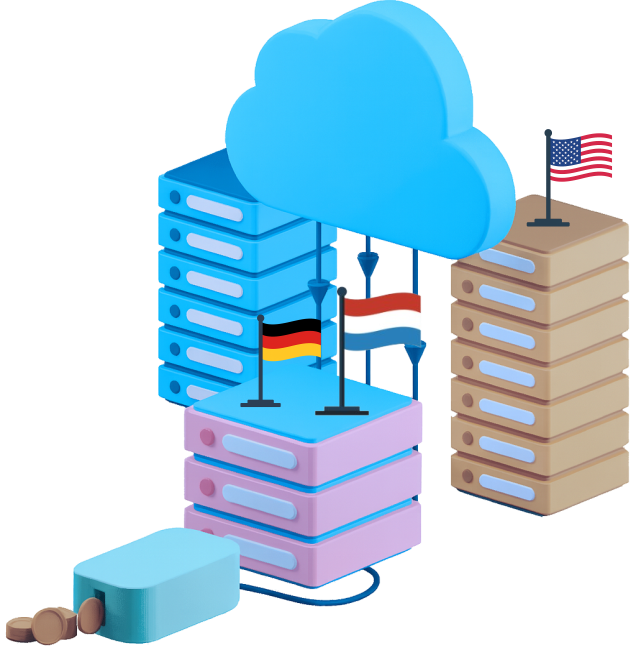Hébergement de serveurs cloud
L'hébergement de serveur cloud fournit une plate-forme dynamique et fiable pour héberger votre site Web ou votre application, tirer parti d’un réseau de serveurs virtuels pour offrir des performances exceptionnelles, évolutivité, et la sécurité. En répartissant les données de votre site sur plusieurs serveurs, cette solution d'hébergement moderne garantit une disponibilité élevée, mise à l'échelle transparente des ressources, et une protection robuste contre les cybermenaces.
Avec Colonel Serveur hébergement de serveur cloud géré, vous accédez à la meilleure infrastructure conçue pour les entreprises, développeurs, et les professionnels du Web cherchant à accroître leur présence en ligne. Explorons l'essence de l'hébergement VPS cloud, ses types, caractéristiques, mesures de sécurité, et pourquoi Colonel est votre partenaire idéal.
Qu'est-ce que l'hébergement de serveur cloud?
L'hébergement de serveur cloud est une méthode d'hébergement Web qui utilise un réseau de serveurs virtuels et physiques pour stocker et fournir les données de votre site Web ou de votre application.. Contrairement aux solutions à serveur unique, L'hébergement de serveur cloud regroupe les ressources sur plusieurs serveurs, permettant des ajustements instantanés pour répondre aux demandes de trafic.
Cette approche garantit que votre site reste accessible même en cas de panne de serveur, grâce à son architecture distribuée. En tirant parti de la virtualisation, vos données sont réparties dans des centres de données mondiaux, réduire la latence et améliorer l'expérience utilisateur. Que vous dirigiez un petit blog ou une plateforme de commerce électronique à fort trafic, l'hébergement Web cloud offre la flexibilité et la puissance nécessaires pour répondre à vos besoins.
Types d'hébergement de serveur cloud
L'hébergement de serveurs cloud englobe différents types, chacun adapté à des besoins spécifiques, des solutions partagées économiques aux serveurs dédiés hautes performances. Comprendre ces options vous aide à choisir la solution adaptée à votre site Web ou à votre application.. Colonel Server propose une gamme de solutions de fournisseurs d'hébergement de serveurs cloud, assurer l'évolutivité, fiabilité, et facilité d'utilisation pour les entreprises de toutes tailles.
Hébergement cloud partagé
Le forfait partagé est une option économique dans laquelle plusieurs sites Web partagent des ressources sur un réseau de serveurs virtuels., ce qui en fait un choix parfait pour l'hébergement de serveurs cloud pour les petites entreprises. Contrairement à l'hébergement mutualisé traditionnel, il exploite l'infrastructure cloud pour une meilleure fiabilité et évolutivité.
Votre site profite du cloud’nature distribuée, garantir la disponibilité même en cas de panne d'un serveur. L'hébergement cloud partagé de Colonel offre un point d'entrée rentable pour les startups et les sites personnels, avec des services gérés pour simplifier les opérations.
Hébergement cloud VPS
Hébergement VPS cloud (Serveur privé virtuel) combine l'isolation d'un serveur privé virtuel avec l'évolutivité de l'infrastructure cloud, fournir des ressources dédiées dans un environnement virtualisé. Votre site fonctionne sur le processeur alloué, RAM, et stockage, mais bénéficie toujours de la flexibilité du cloud pour répartir les charges de travail sur plusieurs serveurs physiques.
Ce type d'hébergement offre un contrôle amélioré, accès aux racines, et options de personnalisation, ce qui le rend idéal pour les développeurs et les entreprises en croissance. Il offre plus de puissance et de fiabilité que l'hébergement partagé, mais à une fraction du coût des serveurs dédiés physiques. L'hébergement Cloud VPS est parfait pour les sites Web qui nécessitent des performances constantes, sécurité renforcée, et la capacité d'évoluer rapidement à mesure que le trafic augmente.
Serveurs cloud dédiés
Les serveurs cloud dédiés offrent un accès exclusif aux ressources d'un serveur virtuel dans le cloud, garantissant des performances maximales, confidentialité, et contrôle. Contrairement à l'hébergement dédié traditionnel, ces serveurs tirent parti des avantages de l'infrastructure cloud, tels que l'évolutivité instantanée, redondance, et protection contre le basculement.
Ils constituent un excellent choix pour les sites Web à fort trafic, applications au niveau de l'entreprise, ou les entreprises exécutant des charges de travail complexes qui exigent des ressources garanties. Avec des serveurs cloud dédiés, vous évitez les dépenses et la rigidité du matériel physique tout en bénéficiant d'une fiabilité et d'une vitesse de premier ordre.
Cela en fait une option rentable mais puissante pour les entreprises qui ne peuvent pas se permettre des temps d’arrêt ou des performances compromises..
Hébergement cloud géré
L'hébergement cloud géré décharge toutes les tâches techniques, comme les mises à jour de logiciels, correctifs de sécurité, surveillance, et sauvegardes, à votre hébergeur. Cela vous permet de vous concentrer entièrement sur la croissance de votre entreprise sans vous soucier de la maintenance du serveur..
Avec un panneau de contrôle simplifié comme hPanel, sauvegardes quotidiennes automatisées, et 24/7 soutien expert, l'hébergement géré garantit que votre site Web fonctionne de manière fluide et sécurisée à tout moment. Il est particulièrement adapté aux startups, petites entreprises, et les équipes non techniques qui souhaitent bénéficier des avantages de l'hébergement cloud sans la complexité.
En choisissant un hébergement cloud géré, vous gagnez en tranquillité d'esprit en sachant que votre infrastructure est optimisée et évolutive pendant que vous consacrez votre énergie aux clients et à la croissance.
Quel type d'hébergement de serveur cloud vous convient le mieux?
Le choix du bon type d’hébergement de serveur cloud dépend de la taille de votre site Web, trafic, et exigences techniques. Chaque option d'hébergement est conçue pour répondre à différents besoins commerciaux, des startups aux grandes entreprises. En comprenant les points forts de chaque type, vous pouvez faire un choix éclairé qui garantit à la fois performances et rentabilité.
- L'hébergement cloud partagé convient aux petites entreprises ou aux sites Web personnels avec des budgets limités. Il offre un moyen abordable d'établir une présence en ligne tout en bénéficiant de la stabilité et de la flexibilité de l'infrastructure cloud..
- Même si les ressources sont partagées, des fournisseurs fiables garantissent que la disponibilité et les performances restent cohérentes, ce qui en fait un choix pratique d'entrée de gamme.
- L'hébergement Cloud VPS est une excellente option pour les entreprises en croissance et les projets de taille moyenne qui ont besoin de plus de puissance et de personnalisation.. Il fournit des ressources dédiées dans un environnement virtualisé, vous offrant un meilleur contrôle sur les configurations et l'évolutivité.
- Les serveurs cloud dédiés sont conçus pour les sites Web à fort trafic, plateformes de commerce électronique, ou des applications complexes qui exigent des performances et une sécurité maximales. Avec un accès exclusif aux ressources, ces serveurs offrent une vitesse exceptionnelle, fiabilité, et flexibilité sans les coûts et les limites du matériel physique.
- L'hébergement cloud géré est parfait pour les entreprises ou les particuliers qui préfèrent une approche pratique. Avec ce type d'hébergement, le fournisseur gère les mises à jour du serveur, correctifs de sécurité, sauvegardes, et surveillance, vous permettant de vous concentrer entièrement sur votre entreprise.
Les experts en hébergement de serveurs cloud de Colonel sont prêts à vous guider dans la sélection du plan le plus adapté à vos objectifs., trafic du site Web, et budget.
Principales fonctionnalités de nos serveurs cloud
L'hébergement de serveurs cloud offre une suite de fonctionnalités avancées conçues pour offrir des performances élevées, évolutivité, et la sécurité de votre site internet ou application. Du stockage ultra-rapide à la connectivité mondiale, l'infrastructure renforce votre présence numérique avec une fiabilité et une flexibilité adaptées à vos besoins.
Stockage SSD et connectivité haut débit
Le stockage SSD et la connectivité haut débit garantissent que votre site Web se charge rapidement et gère efficacement le trafic. Les serveurs cloud utilisent des SSD NVMe, offrant des vitesses de lecture/écriture jusqu'à 5 fois plus rapides que les disques durs traditionnels. Couplé avec 1 Ports réseau Gbps et CDN mondial, votre site fournit du contenu avec une latence minimale, améliorer l'expérience utilisateur et les classements SEO.
Solutions de sécurité et de sauvegarde des données
Les solutions de sécurité et de sauvegarde des données protègent votre site contre la perte de données et les cybermenaces. Cet hébergement de serveur cloud comprend des sauvegardes quotidiennes automatisées, garantir que vos données sont en sécurité et récupérables. Mesures de sécurité avancées comme les pare-feu, Protection DDOS, et le cryptage SSL protège votre site, vous donnant la tranquillité d'esprit.
Centres de données mondiaux & Faible latence
Les centres de données mondiaux réduisent la latence en diffusant le contenu du serveur le plus proche vers vos utilisateurs, améliorer les temps de chargement et la satisfaction des utilisateurs. Les hébergeurs de serveurs cloud exploitent des centres de données en Europe, Amérique du Nord, et l'Asie, intégré à un CDN pour fournir du contenu à une vitesse fulgurante, garantir une expérience transparente pour un public mondial.
Sécurité et conformité des serveurs cloud
La sécurité et la conformité des serveurs cloud sont essentielles à la protection de vos données et au respect des normes réglementaires.. L'hébergement des serveurs cloud de Colonel utilise des mesures de sécurité robustes, y compris le cryptage, pare-feu, et le respect des normes de l'industrie telles que GDPR et HIPAA, garantir que votre site reste sécurisé et conforme aux réglementations mondiales.
Cryptage des données et pare-feu
Le cryptage des données et les pare-feu constituent l’épine dorsale de la stratégie de sécurité du Colonel. Nous utilisons le cryptage AES-256 pour sécuriser les données en transit et au repos, tandis que les pare-feu avancés bloquent les accès non autorisés. Ces mesures protègent votre site des cybermenaces, garantir l’intégrité et la confidentialité des données.
Conformité au RGPD, HIPAA, et normes ISO
Conformité au RGPD, HIPAA, et les normes ISO garantissent que votre site répond aux exigences réglementaires mondiales. L'hébergement des serveurs cloud de Colonel est conçu pour aider les entreprises traitant des données sensibles, comme les soins de santé ou le commerce électronique, dans le strict respect des normes de confidentialité et de sécurité, réduire les risques juridiques.
Sécurité multicouche pour les entreprises
La sécurité multicouche pour les entreprises inclut des adresses IP dédiées, systèmes de détection d'intrusion, et contrôle d'accès basé sur les rôles (RBAC). L'hébergement de serveurs cloud de niveau entreprise de Colonel protège les applications à enjeux élevés avec des défenses en couches, assurer une sécurité robuste aux grandes organisations ayant des besoins complexes.
Qu'est-ce qui impacte les serveurs cloud’ Prix d'hébergement?
Le serveur cloud’Le prix de l'hébergement est déterminé par plusieurs facteurs clés qui affectent directement le niveau de performance, évolutivité, et les fonctionnalités que vous recevez. Comprendre ce qui détermine le prix vous aidera à choisir un forfait qui équilibre l'abordabilité avec les ressources dont votre site Web ou votre application a réellement besoin..
- Allocation des ressources
La quantité de CPU, RAM, et le stockage dont vous avez besoin a le plus grand impact sur le prix de l'hébergement du serveur cloud. Plus de ressources garantissent des performances plus rapides et une meilleure fiabilité, mais ils augmentent également les coûts mensuels. - Volume de trafic et bande passante
Les sites Web avec un trafic plus élevé ont besoin de plus de bande passante pour offrir des expériences fluides aux visiteurs.. Étant donné que l'utilisation de la bande passante affecte directement les coûts d'exploitation, il joue un rôle majeur dans la détermination du prix de l'hébergement. - Options d'évolutivité
Fonctionnalités d'évolutivité flexibles, comme des mises à niveau instantanées des ressources, peut augmenter le serveur cloud’s prix d'hébergement. Cependant, cela garantit que vous pouvez gérer les pics de trafic sans temps d'arrêt, ce qui en vaut la peine. - Fonctionnalités de sécurité
Outils de sécurité avancés tels que la protection DDoS, pare-feu, analyses de logiciels malveillants, et les sauvegardes automatisées ajoutent au coût. Ces fonctionnalités, cependant, sont essentiels pour protéger les données sensibles et assurer la continuité des activités.
Qui devrait utiliser l'hébergement de serveur cloud?
L'hébergement de serveur cloud est idéal pour les entreprises, développeurs, et les professionnels du Web ayant besoin d'évolutivité, un hébergement performant sans la complexité de la gestion des serveurs physiques. Que vous dirigiez une boutique de commerce électronique, un portail riche en contenu, ou gérer plusieurs sites clients, cette solution offre la puissance et la flexibilité requises. Ce type d'hébergement convient:
- Propriétaires de commerce électronique: Gérez des milliers de produits et de visiteurs avec l'optimisation WooCommerce.
- Développeurs Web: Gérez plusieurs projets clients avec une gestion centralisée via hPanel.
- Créateurs de contenu: Gérez des portails d'informations riches en multimédia ou des blogs à fort trafic.
- Fournisseurs SaaS: Prise en charge des applications gourmandes en ressources avec une mise à l'échelle transparente.
- Agences: Rationalisez la gestion de portefeuille avec des balises personnalisées et des outils de collaboration en équipe.
Pourquoi choisir Colonel pour l'hébergement de serveurs cloud?
Choisir le bon fournisseur d'hébergement cloud est essentiel pour garantir les performances, sécurité, et évolutivité. L’hébergement des serveurs cloud de Colonel se démarque par un équilibre de puissance parfait, fiabilité, et facilité d'utilisation, ce qui en fait le choix préféré des entreprises de toutes tailles.
Avec des services entièrement gérés, vous n'avez pas besoin de connaissances techniques approfondies pour faire fonctionner vos serveurs. Fonctionnalités avancées telles que des adresses IP dédiées, CDN mondial, et les sauvegardes automatisées garantissent que votre site Web reste sécurisé, rapide, et toujours accessible.
En plus de ça, Colonel propose des prix d'hébergement de serveur cloud flexibles sur différents forfaits qui offrent une valeur exceptionnelle. Tout cela est combiné avec 24/7 une assistance experte et un tableau de bord hPanel intuitif pour vous aider à gérer et à faire évoluer votre présence en ligne sans effort.
Que vous soyez une startup ou une entreprise mondiale, l'achat d'un hébergement cloud évolue avec votre entreprise.





































